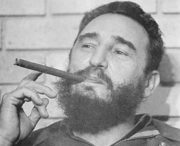Fidelistas
Fidel Castro just turned 90 two days ago — no longer as we remember him, ever youthful, ever vigorous. What did he have that fascinated so many of us for so long, that let him dominate Cuba and from that small base to shake the whole world? And threatening to do more than just shake it, in October 1962. Like him or hate him, you have to acknowledge that his was a personality hard to resist, even by those among us who should have known better.
I confess that, at the time of the Cuban revolution (1959) and for too long afterwards, I was willing to overlook or excuse many glaring excesses, errors or injustices in or sponsored by Cuba. This was mainly because of the international context: the Cuban revolution’s enemies, beginning with the United States, supported even greater inequalities and injustices in Latin America and elsewhere (most notably in Vietnam), including support of horrendous dictatorships. One had to support Cuba because one was so opposed to, for example, Pinochet.
But besides this context, which inclined so many of us to revolutionary solutions, there was another component of fidelismo, the personal attraction of Fidel, due essentially to three attributes : his audacity, self-confidence, and astuteness.
His audacity was the most impressive, coupled with his enormous energy. Audacity is not necessarily a good thing, though most of us could use more of it and we almost always admire it, or at least respect it. It’s not the same as bravery; according to some former comrades of Fidel’s, he was not especially brave under fire in the Sierra Maestra (as described here). Audacity is to assault an opposing force or stronghold, even a very strong one. Bravery is standing up to an assault, not necessarily to look for one — brave men are usually also cautious, but caution has not been Fidel’s strong suit. The assault on Moncada set a pattern. It was a disastrous (and foreseeable) military failure, especially for most of Fidel’s comrades, but it was audacious “propaganda of the deed” which caught everybody’s attention.
It was his projection of supreme self-confidence and certainty of success (whether real or feigned) that enabled Fidel to involve so many others in his adventures, which otherwise would have been merely reckless personal risks. Sometimes the adventures did succeed, at least in part. The Angola intervention, for example, although the costs for Cubans — lives, money-costs, and ensuing political conflicts in the army itself — were very high.
The third essential attribute has been astuteness. Fidel has always been a quick learner and a quick improviser of possible solutions to the many problems he has got himself and his country into. Not always the wisest or best solutions, or well thought-out, but usually the quickest and almost always the most audacious. Like persuading Khruschev to install missiles in Cuba, as a response to threats of a repeated US invasion, which very nearly brought us to nuclear war. Or the campaign of “Ten million tons” of sugar in 1970, or — many others.
Now that he is 90, the energy has faded, his sharp remarks sound more cranky than astute, and his confidence — ¡Hasta la victoria siempre! — almost a joke. What remains is the audacity, now reduced to gestures in his columns in Granma.
Happy birthday, Fidel. You’ve had a good run and given the world a good shake. The people and movements you inspired have, through mighty struggle, won dignity and respect in parts of the world that hadn’t had them. From here on, it will be up to the Cubans and all of us to find our paths in a world that you did much to change.
